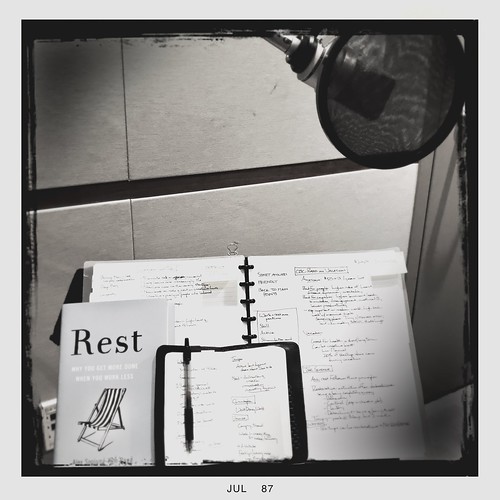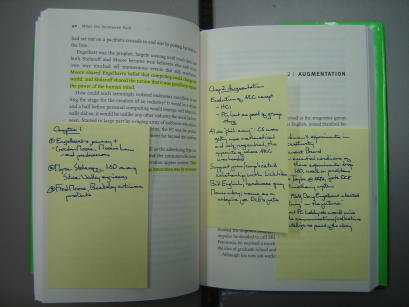I was on CBC Radio’s call-in show “Ontario Today” earlier today, talking about “The key to a restful vacation.” You can listen here:
It was a fun time for me at least, partly because it involved more interaction with an audience than many radio interviews, and because I actually went into it with a certain amount of apprehension. To be honest, in Rest I have about six pages about vacations, so I was concerned that I’d have enough to say!
Fortunately, guest host Amanda Pfeffer was outstanding, and did a terrific job of guiding the conversation back to the book. I also do a fair amount of prep before these interviews, and now have a decent system for working through my notes and thinking about my responses, as you can see.
The Stanford Video folks (who are outstanding– they’re all the kinds of low-key professionals you want to work with during stressful situations, or just during moments when you need to be totally focused and on) keep a sheet music stand in the studio, and I make good use of it.
Beforehand, I’ll take some time to write out some notes, the key ideas I want to repeat or return to, and reminders to keep my answers short, stay on point, and let the host guide things. It’s usually the same set of notes, the same points, and same reminders every time (I am talking about the same book, after all); but it helps to write them out every time, to keep them fresh in my mind.
I also carry a copy of the book into the studio, though frankly I don’t refer to it during a live show– there’s not time to page through it.
You’ll notice a couple post-its, which have the host’s name– you never want to get that wrong– and the schedule for breaks.
I also keep my small notebook handy (in my lap), and write down the names of callers and the main points I want to make in response to their stories or questions. The virtue of this is that if I have only one or two points to make, I’ll make them more quickly if I can write them down and refer to them, and I’m less likely to strike off on some digression. I’m also more likely to get people’s names right if I write them down and can refer to them. Finally, if I can connect points that two callers 40 minutes apart make, I look like A Freaking Genius.
Today’s setup is not unusual for me. I’ve learned that interviews go better if I have some aide-memoire to jog my memory, or anchor the conversation. This was the desk when I was interviewed by Bob Edwards about The Distraction Addiction:
I’m very big on note-taking as a tool for thinking more clearly, as the book below illustrates, so realizing that doing it for interviews would help was a significant thing.
I think I’m getting better at interviews, though it’s like being a musician or teacher: it’s one of those pieces of craft that you can refine and improve for a lifetime. But at least I recognize that it’s a craft, and I’m learning how to build a structure that helps me do well and improve. (So I hope.)



